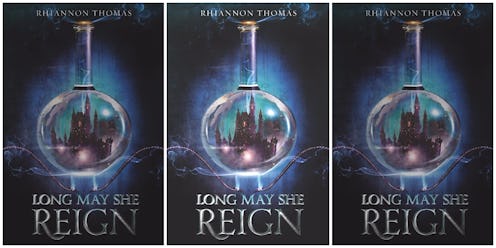Books
New YA Highlights Importance Of Science Heroes

It's a commonly parroted statistic that women are underrepresented in the STEM (Science, Technology, Engineering, and Mathematics) fields. The current truth is that women are underrepresented in many STEM fields, and it's still into that world of thinking that Long May She Reign's science hero Freya steps. In Rhiannon Thomas' brand new novel, out Feb. 21 from HarperTeen, the king's fourth cousin once removed becomes the queen of Epria in an instant when everyone at the king's birthday banquet is mysteriously poisoned. She and her best friend Naomi are one of the few to escape this grim fate, because Freya had already snuck out of the party... to go back to her laboratory and work on her chemical experiments. And thus, Freya takes her place among the Tony Starks, Barry Allens, and even Walter Whites of the pop cultural world, and that's really important.
Though the numbers aren't as dire as they've been in the past, the fact still remains that women are underrepresented in the science and engineering workforce, according to the National Girls Collaborative Workshop. While women are killing it in the biological sciences, only 39 percent of women received bachelor's degrees in the physical sciences — like chemistry, Freya's area of expertise.
Long May She Reign by Rhiannon Thomas, $10.98, Amazon
But it's in pop culture that this rarity is most harshly felt. Media portrayals of female scientists — taken seriously and not sexualized — are very rare. For every Hidden Figures and Ghostbusters, there's The Big Bang Theory and Jurassic World. As a 2013 New York Times article about the dearth of women in the science fields pointed out:
...what remotely normal young person would want to enter a field populated by misfits like Sheldon, Howard, and Raj? And what remotely normal young woman would want to imagine herself as dowdy, socially clueless Amy rather than as stylish, bouncy, math-and-science-illiterate Penny?
Well, the remotely normal young women of the next generation will have the opportunity to imagine themselves as misfit queen Freya, whose differences propel her to steer her kingdom in such a new direction that she earns the admiration of the villain and whose nerdy interest in science saves her people from what would have been a truly bloody civil war.
Freya's love for chemistry is one of her most defining qualities alongside her compassion and her social anxiety. This is a girl who has a panic attack when she trips in a crowded hall, who needs her best friend to steer her outside to calm herself down, whose words get caught in her throat when she tries to be commanding. That same girl ascends to the throne, believing wholeheartedly that she can't do it but coming to realize that if she must do it then it is her responsibility to her people to do it well. And that same girl carves out a niche in her new life as a royal for her scientific interests, which draws the eye of Fitzroy, impresses new friend Madeleine and old friend Naomi, and eventually ends up saving the day. I repeat: if Freya hadn't been a scientist, a nerd, a misfit, a geek, then the kingdom of Epira would have surely been doomed. It's a completely ordinary skill that anyone who studied could have, and that's what saves her world.
And that's really important for young women to see. I'm not saying their interest in science will exist or not exist purely on the basis of whether they have more Dr. Erin Gilberts to look up to than Dr. Amy Farrah Fowlers. But I am saying that representation is important, especially in the teen years when women are deciding who they are, what they want to be, and, especially, what degree to pursue for the four years of their life post-high school. As reinforced by the Geena Davis Institute on Gender in Media, "if she can't see it, she can't be it." Or, in other words, "Omission or negative gender stereotypes in media can generate life-long imprints that can shape feelings of self-worth and behavior."
So when we underrepresent female scientists in pop culture, we're excluding women from a narrative that they deserve to be a part of. And Thomas seems to recognize that in her characterization of Freya, a chemist whose interest in the scientific field earns her mistrust and judgment, curiosity and admiration, in equal turns. Whose love for science made her the odd one out growing up, but who still grew up to be a queen who likely inspired a whole new generation of female Epirian scientists. Who isn't the chosen one destined for the throne and great power, but who worked and studied to be the scientist that she is, and easily and eagerly teaches what she knows to others so they can learn too.
Let's just have more science heroines in YA literature in 2017, please. I need another Freya in my life to remind me that I don't need to have a secret, hidden power to be a hero. And, more importantly, that science isn't just for men.